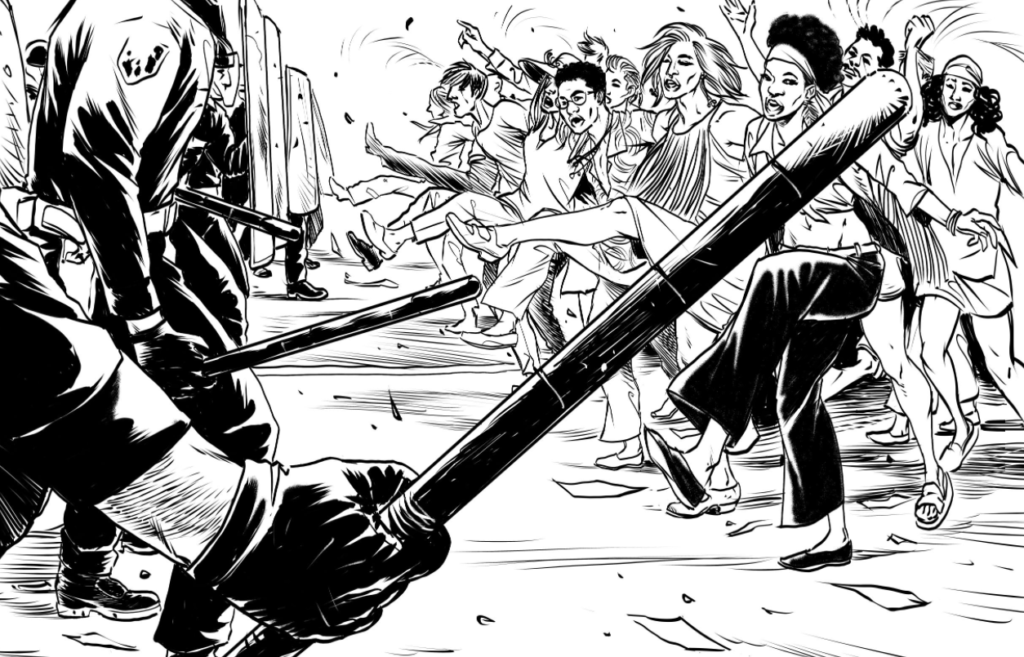
Stonewall 1969 – A War Story is an RPG set during the Stonewall riots
The Stonewall riots are celebrated with Pride marches organized all over the world each year in June. An upcoming tabletop RPG, Stonewall 1969 – A War Story created by Italian game designer Stefano Burchi and published by Asterisco Edizioni, follows a diverse group of LGBTQIA+ characters caught up in those events. And it’s now looking for funding on Kickstarter.
In the night between 27 and 28 June 1969, police raided the Stonewall Inn, a well-known gay bar in the Greenwich Village of New York City. Stonewall wasn’t an immaculate place: it was managed by organized crime, wealthy customers were blackmailed by the owners and there was no running water. But it was also the only place in New York where homosexual men were allowed to dance together, and one of the few places where men could wear makeup without fear. In the 50’s and 60’s, homosexual behaviours, and even gender non-conforming outifts, were considered (in practice and, sometimes, literally) illegal in the United States. From 1952 to 1973 homosexuality was classified as a mental disorder.
Violent police raids were not uncommon, and gay bars were usually warned of them beforehand by corrupt officers, but that night the police found the patrons of the Stonewall Inn both unusually unprepared, yet unexpectedly combative. The patrons were joined by people from the neighborhood and its bars, by street kids, the homeless youth who used to sleep in nearby Christopher Park and who considered the Stonewall akin to a haven. And their reaction against the police turned into days of spontaneous protests and riots.
“Most of my cis straight friends and some LGBTQ+ ones didn’t know what Stonewall meant for the community” Burchi tells Gayming Magazine through text and voice chat. “So I thought a roleplaying game could have been a good tool to speak about the Stonewall riots.” Even though gay, lesbian and trans activism had long existed before 1969 and that was not the first time gay, lesbian, bisexual and transgender people fought back against police violence, Stonewall opened up a new age, first and above all in the Western world. After the events at Stonewall, LGBTQIA+ activism got bolder.
Burchi began to work on the concept of Stonewall 1969 – A War Story in 2015 and developed it following the general structure of Frederik Jensen’s Montsegur 1244. Montsegur 1244 tells the story of the siege of the Château de Montségur, where the last Cathar heretics stood against the attack of French royal forces between 1243 and 1244. Burchi adapted Montsegur 1244’s format for his purpose: if there’s a siege in Stonewall 1969 – A War Story it’s a metaphorical one, “a social siege” as Burchi says. The game doesn’t even talk about what we’d conventionally call a “war” and it’s not a combat-based experience with dice rolls and health points akin to TTRPGs like Dungeons and Dragons or Pathfinder. The title is inspired by a sentence from Simeone De Beauvoir’s The Second Sex instead: “all oppression creates a state of war.”
The game is designed to be experienced in a single session lasting between 3 to 5 hours and split into different sections (a prologue, five acts and an epilogue). There’s not a proper game master, but one person should read the manual before playing in order to act as a facilitator (the one who actually knows the rules and leads the game), while a step-by-step guide explains what to do. Players take turns and frame the scenes focused on their main character, all taken from a prebuilt cast of 14 unique characters, while the other players contribute to the storytelling with their own main or secondary characters, who either support or oppose the action. We explore the past of these people, their relationships, the discriminations and the conflicts they’ve faced and why they were at the Stonewall Inn that night, and then we play the events of the riots and their consequences.

Fictional events can resonate with your personal experience and affect you, and in a game like Stonewall 1969 – A War Story players can meet potentially problematic and emotionally heavy situations. Burchi’s friends often joke that he writes RPGs designed to make players cry. Because of that, every session starts with the reading of an introduction explaining the themes and setting the tone of the game. Its manual has a chapter detailing how to manage the intensity of the experience, and players can use safe words to modulate its “emotional volume.”
Maybe the most interesting aspect of this project is how Burchi decided to focus on the often-overlooked intersectional nature of that uprising and on the role played by the most marginalised people. “The characters are designed around the principle of intersection of discrimination,” Burchi writes us. “They represent the homeless youth who lived on the streets because they were runaways or because their parents didn’t want them because of their queerness; the non-white transgender people; people with a family who were secretly queer and risked to lose everything they had because of what they were. There is a war veteran who lost State aid because he was dishonorably discharged. There are gay, lesbian and bisexual cis people.”
Burchi, with the help of Asterisco Edizioni, also worked with sensitivity readers in order to respectfully deal both with these identities and with the often offensive language used to talk about them in the 60s.
Stonewall 1969 – A War Story is not a history class, of course, but it can be a way to understand the roots of the LGBTQIA+ community from the intersectional perspective of a tabletop RPG. “Telling our stories and sharing what made us what we are today is a way to fight against the homo-lesbo-bi-transphobic and patriarchal culture we live in,” Burchi concludes. “2021 in particular was a tough year, not just because of the pandemic, but because the Italian Senate voted against a bill [the “DDL Zan,” named for Italian lawmaker Alessandro Zan] meant to provide basic recognition and defense against hate crimes based on gender identity and sexual orientations. It is also a way to remember why it is important to celebrate Pride and that there are still too many places where being LGBTQ+ is illegal or cause of oppression.”
Unfortunately, we guess no committed homotransphobe will play it and learn something from it. But Stonewall 1969 – A War Story is a powerful tool for creating choral emergent stories, for celebrating our past, for looking at our present struggles, and for at least giving new perspectives to our more clueless allies.





